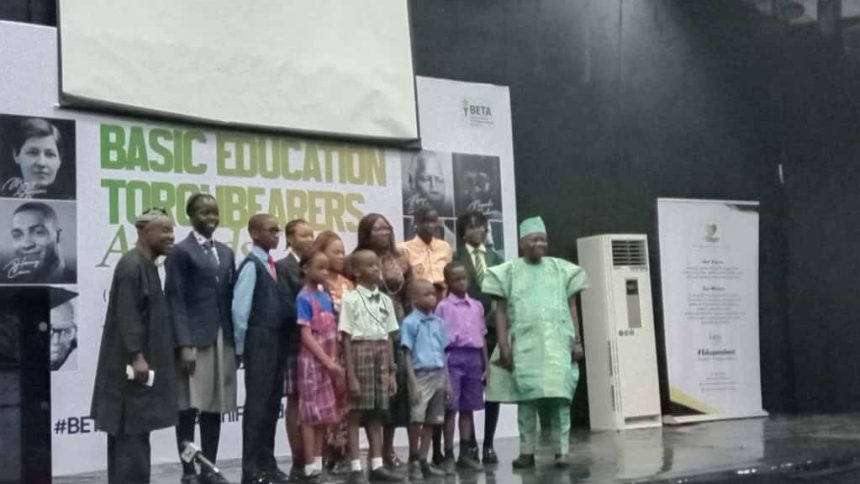…..Prof Omolewa Seeks Prioritization Of Teachers, Stakeholders
In a bid to spotlight excellence and dedication in Nigeria’s basic education sector, The Adunni Foundation celebrated outstanding contributions at the maiden edition of its Basic Education Torchbearers Awards (BETA).
The event held on Tuesday at the NECA House, Alausa, Lagos, was with the theme: ‘Education is true independence: Honouring the past to build the present and the future.’ brought together scholars, educators, pupils and stakeholders in basic education.
According to organisers, the programme was to recognize educators, students and advocates who have demonstrated exceptional commitment to improving learning outcomes across Nigeria and have also made remarkable strides in shaping young minds.
In her opening remarks, Mrs. Motunrayo Famuyiwa-Alaka, Founder, BETA stated that the foundation is a movement built on goodwill as capital and the vision is a world where the spirit of goodwill transforms lives, uplifts communities, and spreads healing without boundaries.
She said: “We are building a movement of people who go beyond the labels of religion to be active do-gooders and part of systems of generosity that address poverty, poor education, underemployment, hunger, and inequality using goodwill as capital.
“While education is our focus, we will also respond to other development needs through pop-up interventions that tackle hunger, poverty, and unemployment.
“We will establish The Adunni Academy, a space to grow communities of intentional do-gooders.”
Famuyiwa-Alaka also announced the unveiling of Edupendent, which is a blend of Education and Independence.
She explained that it is a movement that reframes independence as the empowerment of minds, not just the liberation of nations. Edupendent is our bridge between reporting injustice and repairing society, using goodwill to fuel learning and civic growth.
“Our message is simple: Education is independence. Nigeria will only be truly independent when it becomes intentional about educating her young minds, beginning with a clear, committed focus on compulsory basic education. Our independence, political, social, and moral, is only meaningful if we invest in the minds that will sustain it,” she added.
She reiterated that Nigeria gained political independence in 1960, adding that yet in 2025, over 18 million children remain out of school. “If the children are out of school, where are they? They are in homes as maids and child brides, in markets as labourers, on the streets at risk, denied the chance to learn, to dream and to lead.
“Our five-year goal is to work with partners to reduce that number by at least 50%; because Nigeria will only be truly free when our children are free from ignorance. We cannot claim independence when our young minds are trapped in poverty. Edupendent is our call to national responsibility and to redefine independence as the empowerment of minds.”
The keynote speaker, Emeritus Professor of Education, Former Nigeria Ambassador to UNESCO, Professor Michael Omolewa reiterated the importance of education stating that it must be accessible to all and not a privilege but a right and an entitlement.
He explained that the colonial government recognized education as a critical pillar upon which Independence would be built. Their vision was of a vibrant, inclusive education system, one that would reach both males and females, the young and the old, across all levels of education: primary, secondary, tertiary, formal, and non-formal.
“The benefits of widespread education are far-reaching thus reducing disorder in public spaces, increasing civic participation, and fostering inclusive development.
“Research consistently links the quantity and quality of education to progress in economic growth, health, political stability, and overall well-being. The more educated and engaged the population, the greater the potential for innovation and national advancement.
“Therefore, it is crucial to carefully manage all aspects of education, deliberately shaping it into a tool for nation-building to maximize its impact. A comprehensive and quality education has the potential to overcome societal pressures and achieve remarkable results,” he said.
Prof Omolewa however said that despite some limited progress in the education sector, much remains to be done for African countries to catch up with the rapid advancements seen in leading nations around the world because while others soar, Africa continues to tread slowly along the path of educational development.
He added that the often-cited “political will” must now be backed by substantial investment, sacrifice, and deliberate action to move the continent forward in this broad and vital field.
“The recently released Times Higher Education World University Rankings for 2026 should be a wake-up call. Universities in the United States, Europe, and Asia continue to dominate globally.
“In Africa, South Africa leads with seven of the top eleven universities in the region, followed by Egypt and Morocco. This trend underscores the urgent need for Nigeria to deepen its commitment to providing and promoting quality education, as a priority.”
He disclosed further that the United Nations’ designation of the Literacy Decade, along with the adoption of the Millennium Development Goals (MDGs) and Sustainable Development Goals (SDGs), especially its Goal 4, generated global interest in the value and potentials of quality education.
“However, these initiatives have yet to bring about significant transformation through education in many countries. There was also a time when the World Bank actively sponsored research and development in education, but today, little is heard of such contributions, ironically, at a time when they are most urgently needed.
“We are once again presented with an opportunity to reimagine and reform our educational system. There is a pressing need to create a learning environment that fosters academic excellence: build well-equipped laboratories, modernize and digitize library collections, preserve and enhance access to archives for research, and, critically, prioritize the welfare of teachers and all stakeholders in the education sector,” he advised.
He commended The Adunni Foundation, adding that over the years, many individuals, institutions, and NGOs have contributed significantly to shaping Nigeria’s educational and national development landscape. “The Adunni Foundation is aware of many of these pioneers and trailblazers and is committed to recognizing their legacy.”
Some of the recipients for BETA Posthumous awards include Sir. Ahmadu Bello, Chief Obafemi Awolowo, Alhaji Lateef Jakande, Mr Josiah Soyemi Ogunlesi, Dr. Tai & Mrs. Sheila Solarin and Prof. Akin Mabogunje, amongst others.
For students’ awards, Salihu Amir Umar, Kadwell International School, Kaduna came first while Michael Daniella Chiamaka of Chrisland College, Opebi and Ogunsola Esther, Oritamefa, Baptist Model School, Ibadan, Oyo State came second and third respectively in the 2025 Basic Education Certificate Examination (BECE) conducted by NECO.
Overall best candidates in the National Common Entrance Examination (NCEE) also conducted by NECO was received by Michelle Kosisochukwu Okeke of Wesley Place Private School, Ikoyi, Obalende, Lagos while Nwachukwu Michelle Kosisochukwu and Alocha Naeto Daniel came second and third respectively.
BV.











